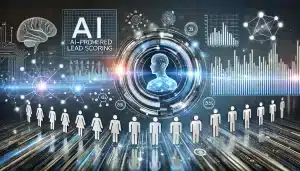Introduction
Lead scoring is a vital process for businesses aiming to optimize their sales and marketing strategies. It helps organizations prioritize leads based on their likelihood to convert into customers, ensuring that sales teams focus their efforts on the most promising prospects. Traditionally, lead scoring was a manual and subjective process, relying on predetermined criteria and rules. However, the integration of Artificial Intelligence (AI) into lead scoring has significantly improved its accuracy and efficiency. AI-Powered Lead Scoring systems can analyze vast amounts of data, uncover hidden patterns, and predict the likelihood of conversion more precisely than traditional methods. By utilizing machine learning and predictive analytics, AI enhances the lead scoring process, enabling businesses to make smarter decisions, automate tasks, and ultimately increase conversion rates.
As the marketplace becomes more competitive, businesses need to stay ahead of the curve by adopting AI-powered tools that streamline lead management and enhance marketing and sales performance. With AI’s ability to process data in real-time, companies can dynamically adjust their strategies, identify high-potential leads, and nurture them effectively. In this article, we will explore the various aspects of AI in lead scoring, from its benefits and impact on sales performance to the key technologies and strategies businesses can implement to leverage AI for improved outcomes.
What is Lead Scoring and How Does it Work?
Understanding the Basics of Lead Scoring
Lead scoring involves assigning a numerical value to each lead, indicating their potential interest in a company’s products or services. This score is calculated based on various criteria such as the lead’s demographic information, online behavior, and interactions with the company’s content.
Benefits of Implementing AI in Lead Scoring
Integrating AI into lead scoring processes offers numerous benefits, including improved accuracy in predicting lead quality, enhanced efficiency in lead management, and the ability to handle vast amounts of data to identify valuable prospects effectively.
Comparison Between Traditional and AI-Powered Lead Scoring
Traditional lead scoring methods rely on predetermined rules and scoring criteria, which may lack flexibility and adaptability. In contrast, AI-powered lead scoring systems leverage machine learning algorithms to continuously learn and optimize scoring models, resulting in more accurate predictions of lead conversion potential.
How Can AI Improve Lead Scoring Accuracy?
Role of Machine Learning in AI-Powered Lead Scoring
Machine learning algorithms play a crucial role in AI-powered lead scoring by analyzing historical data to identify patterns and trends that can predict which leads are most likely to convert. This dynamic approach enables companies to refine their lead-scoring models for better outcomes.
Utilizing Predictive Lead Scoring for Enhanced Results
Predictive lead scoring uses AI algorithms to forecast which leads are more likely to become customers, allowing sales and marketing teams to focus their efforts on high-potential prospects. By leveraging predictive analytics, businesses can optimize their lead nurturing strategies and improve conversion rates.
Impacts of AI on Sales and Marketing Teams
The integration of AI in lead scoring processes can revolutionize the way sales and marketing teams operate. AI-powered tools provide valuable insights into lead behavior, enabling teams to personalize their outreach efforts and engage with prospects more effectively, leading to increased sales efficiency.
What Are the Key Components of an AI-Powered Lead Scoring System?
Integration with CRM Systems for Seamless Operations
Integrating AI-powered lead scoring systems with Customer Relationship Management (CRM) platforms streamlines the lead management process, ensuring that teams have access to real-time data and insights for more informed decision-making.
Optimizing Lead Scoring with New Data Sources
AI algorithms in lead scoring can utilize diverse data sources beyond traditional demographics, including behavioral data, social media interactions, and purchase history. By incorporating new data points, businesses can enhance the accuracy of their lead-scoring models.
The Influence of AI Algorithms on Conversion Rates
AI algorithms play a significant role in predicting conversion rates by analyzing various factors that contribute to lead qualification. By leveraging AI-powered algorithms, companies can identify leads that are most likely to convert and tailor their marketing strategies accordingly.
Why Is Predictive Lead Scoring Important for Future Marketing Strategies?
How AI Predictive Lead Scoring Affects Marketing Campaigns
Predictive lead scoring powered by AI can transform marketing campaigns by enabling businesses to target the right audience with personalized messaging. By predicting customer behavior and preferences, companies can create more effective marketing strategies that resonate with their prospects.
Forecasting Promising Leads with AI-Powered Systems
AI-powered predictive lead scoring systems allow businesses to forecast promising leads with a high likelihood of conversion. This proactive approach empowers sales teams to prioritize their efforts on leads that are most likely to result in successful deals, leading to improved sales performance.
Strategies to Enhance Lead Scoring Models for 2024
As we look towards 2024, businesses are focusing on enhancing their lead-scoring models with AI technology to stay ahead in a competitive market. By adopting innovative strategies and leveraging AI predictive analytics, companies can optimize their lead-scoring processes for better outcomes and increased revenue.

How Can Companies Leverage AI for Enhanced Lead Scoring Results?
Implementing AI in HubSpot for Dynamic Lead Scoring Solutions
Companies can leverage AI technology within HubSpot to create dynamic lead-scoring solutions that adapt to changing market dynamics and customer behavior. By automating lead-scoring processes with AI, businesses can identify high-value prospects efficiently and drive targeted marketing campaigns.
Utilizing Data-Driven Approaches for Optimal Lead Scoring
Utilizing data-driven approaches in lead scoring allows companies to make informed decisions based on actionable insights derived from data analysis. By harnessing the power of AI and machine learning, businesses can optimize their lead-scoring strategies and improve the accuracy of identifying valuable leads.
Improving AI Lead-Scoring Techniques Using Einstein Lead-Scoring
Einstein Lead Scoring, a feature within Salesforce’s CRM platform, offers advanced AI capabilities to enhance lead-scoring techniques. By leveraging Einstein Lead Scoring, companies can gain deeper insights into lead behavior and preferences, enabling more targeted and personalized interactions with prospects.
Q: What is lead scoring and how does it benefit from AI technology?
A: Lead scoring is a method used to rank prospects based on their likelihood to convert into customers. AI technology enhances lead scoring by analyzing vast amounts of data quickly and accurately, helping businesses identify valuable leads efficiently.
Q: How does AI-powered lead scoring differ from traditional lead scoring methods?
A: AI-powered lead scoring uses predictive models and generative AI algorithms to predict customer behavior and potential value. This is more dynamic and precise compared to traditional lead scoring which relies on manual analysis and predetermined scoring criteria.
Q: What are the benefits of using AI for lead scoring?
A: Using AI for lead scoring offers benefits such as improved accuracy, more effective lead generation, the ability to close more deals, and the automation of time-consuming tasks in the lead qualification process.
Q: How can predictive lead scoring help improve lead generation efforts?
A: Predictive lead scoring can help businesses target the most promising leads by analyzing customer data, behavior patterns, and interactions. This targeted approach can lead to better-quality leads and increased conversion rates.
Q: How is predictive lead scoring implemented in AI systems?
A: Predictive lead scoring in AI systems involves using historical data to train the AI algorithms, which then create predictive models to score and rank leads based on their likelihood to convert. This allows businesses to make data-driven decisions in their marketing and sales efforts.
Q: What role does marketing automation play in AI lead-scoring systems?
A: Marketing automation tools can integrate with AI lead scoring systems to streamline lead nurturing processes, deliver personalized content, and automatically assign scores to leads based on their interactions with marketing campaigns.
Q: How can businesses benefit from implementing predictive lead scoring?
A: Implementing predictive lead scoring can result in better lead quality, increased sales efficiency, higher conversion rates, and improved ROI on marketing campaigns. It allows businesses to focus their efforts on leads with the highest potential for conversion.
Conclusion
AI has revolutionized the lead-scoring process by introducing automation, accuracy, and predictive capabilities. Through machine learning and predictive analytics, businesses can better understand customer behavior, prioritize high-quality leads, and optimize their marketing and sales efforts. AI-powered lead scoring enhances the efficiency of sales teams, reduces operational costs, and ultimately drives higher conversion rates. As businesses continue to embrace data-driven strategies, AI will play a pivotal role in refining lead management systems, improving customer engagement, and increasing revenue. Companies that leverage AI to enhance their lead-scoring models will be better positioned to stay competitive, target the right prospects, and achieve sustainable growth.
Frequently Asked Questions (FAQs)
Q1: What is lead scoring, and how does AI improve it?
A: Lead scoring is the process of ranking prospects based on their likelihood to convert into customers. AI enhances lead scoring by analyzing vast amounts of data, predicting customer behavior, and providing more accurate insights into which leads are most likely to become paying customers.
Q2: What are the key benefits of AI-powered lead scoring?
A: AI-powered lead scoring improves the accuracy of lead predictions, automates time-consuming tasks, and helps prioritize high-potential leads. This results in increased efficiency, higher conversion rates, and more effective lead nurturing.
Q3: How does predictive lead scoring work in AI systems?
A: Predictive lead scoring uses historical data to train AI algorithms, which then create predictive models that assess the likelihood of leads converting into customers. This allows businesses to target their marketing and sales efforts toward leads with the highest potential for success.
Q4: How can AI-powered lead scoring benefit sales teams?
A: AI-powered lead scoring provides sales teams with valuable insights into which leads are most likely to convert, allowing them to focus their efforts on high-quality prospects. This enhances productivity, reduces wasted effort, and increases sales efficiency.
Q5: How does AI compare to traditional lead-scoring methods?
A: AI-powered lead scoring is more dynamic and accurate than traditional methods, which rely on manual processes and predetermined criteria. AI systems continuously learn and adapt to new data, improving their predictive capabilities over time and delivering better results.


